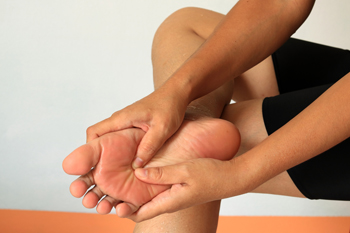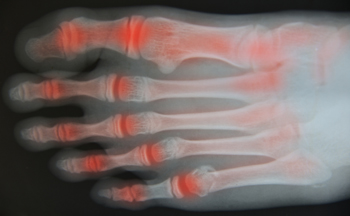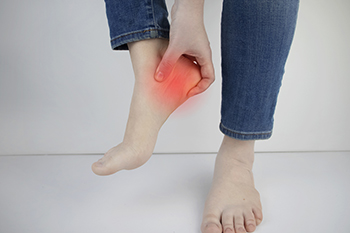Connect With Us
Blog
Items filtered by date: April 2022
Sever’s Disease Symptoms

Sever’s disease is related to swelling and irritation of the growth plate in the heel of the foot during puberty (typically 9 to 14 years of age). The growth plate, an area of the foot that is weaker and more apt to sustain injury than the rest of the bone, is a layer of cartilage in the foot near the end of a bone where most of bone growth occurs. During a growth spurt, muscles and tendons can become tight and pull on the growth plate. Activities like sports or prolonged standing can aggravate this condition. A child who has Sever’s disease might complain about tenderness or pain in one or both of their heels, experience stiffness in their feet upon awakening, start limping or walking on their tiptoes, or feel pain when their heels are squeezed from both sides. If your child is experiencing heel or foot pain of any sort, a visit to a podiatrist is suggested for proper diagnosis of the problem and appropriate treatment. If properly treated (with rest, ice packs, over-the-counter pain relievers, shoe inserts, or more), Sever’s disease is usually not long-lasting or chronic.
Making sure that your children maintain good foot health is very important as they grow. If you have any questions, contact Dr. Rouder of S.I. Podiatry. Our doctor can provide the care you need to keep you pain-free and on your feet.
Keeping Children's Feet Healthy
Having healthy feet during childhood can help prevent medical problems later in life, namely in the back and legs. As children grow, their feet require different types of care. Here are some things to consider...
Although babies do not walk yet, it is still very important to take care of their feet.
Avoid putting tight shoes or socks on his or her feet.
Allow the baby to stretch and kick his or her feet to feel comfortable.
As a toddler, kids are now on the move and begin to develop differently. At this age, toddlers are getting a feel for walking, so don’t be alarmed if your toddler is unsteady or ‘walks funny’.
As your child gets older, it is important to teach them how to take care of their feet.
Show them proper hygiene to prevent infections such as fungus.
Be watchful for any pain or injury.
Have all injuries checked by a doctor as soon as possible.
Comfortable, protective shoes should always be worn, especially at play.
If you have any questions please feel free to contact our office located in Staten Island, NY . We offer the newest diagnostic and treatment technologies for all your foot and ankle needs.
What Is Peripheral Neuropathy?
 Many people with diabetes, especially those over 55 years old, develop a condition known as peripheral neuropathy. It affects nerves in the outer portion of the body, rather than in the heart and central core. A common symptom of peripheral neuropathy is a feeling of pins and needles, combined with shooting pain in the feet. You may also feel a loss of balance, lack of coordination, and muscle weakness. In addition, neuropathy may also cause sores on your feet to take a long time to heal. Diabetes is thought to be a major cause of peripheral neuropathy, the result of continual high blood sugar levels that damage the nerves. Other causes include direct injury to the nerves, a viral infection (such as shingles), a side-effect of some medications, smoking, and drinking too much alcohol. If you have diabetes or are experiencing any of the above symptoms, it is a good idea to develop an ongoing relationship with a podiatrist for a diagnosis, continued monitoring, and treatment specific to your case.
Many people with diabetes, especially those over 55 years old, develop a condition known as peripheral neuropathy. It affects nerves in the outer portion of the body, rather than in the heart and central core. A common symptom of peripheral neuropathy is a feeling of pins and needles, combined with shooting pain in the feet. You may also feel a loss of balance, lack of coordination, and muscle weakness. In addition, neuropathy may also cause sores on your feet to take a long time to heal. Diabetes is thought to be a major cause of peripheral neuropathy, the result of continual high blood sugar levels that damage the nerves. Other causes include direct injury to the nerves, a viral infection (such as shingles), a side-effect of some medications, smoking, and drinking too much alcohol. If you have diabetes or are experiencing any of the above symptoms, it is a good idea to develop an ongoing relationship with a podiatrist for a diagnosis, continued monitoring, and treatment specific to your case.
Neuropathy
Neuropathy can be a potentially serious condition, especially if it is left undiagnosed. If you have any concerns that you may be experiencing nerve loss in your feet, consult with Dr. Rouder from S.I. Podiatry. Our doctor will assess your condition and provide you with quality foot and ankle treatment for neuropathy.
What Is Neuropathy?
Neuropathy is a condition that leads to damage to the nerves in the body. Peripheral neuropathy, or neuropathy that affects your peripheral nervous system, usually occurs in the feet. Neuropathy can be triggered by a number of different causes. Such causes include diabetes, infections, cancers, disorders, and toxic substances.
Symptoms of Neuropathy Include:
- Numbness
- Sensation loss
- Prickling and tingling sensations
- Throbbing, freezing, burning pains
- Muscle weakness
Those with diabetes are at serious risk due to being unable to feel an ulcer on their feet. Diabetics usually also suffer from poor blood circulation. This can lead to the wound not healing, infections occurring, and the limb may have to be amputated.
Treatment
To treat neuropathy in the foot, podiatrists will first diagnose the cause of the neuropathy. Figuring out the underlying cause of the neuropathy will allow the podiatrist to prescribe the best treatment, whether it be caused by diabetes, toxic substance exposure, infection, etc. If the nerve has not died, then it’s possible that sensation may be able to return to the foot.
Pain medication may be issued for pain. Electrical nerve stimulation can be used to stimulate nerves. If the neuropathy is caused from pressure on the nerves, then surgery may be necessary.
If you have any questions, please feel free to contact our office located in Staten Island, NY . We offer the newest diagnostic and treatment technologies for all your foot care needs.
How to Deal With Arthritic Foot Pain
Arthritis, a painful inflammatory condition, can affect many parts of the body including the feet, particularly as you age. Arthritic foot pain often comes with stiff joints, as well as a loss of strength, flexibility, and mobility in the affected area. Various things can be done to relieve pain and slow the progression of this disease, including foot massages to improve circulation and decrease tension in the joint, using heat (to loosen the muscles and reduce stiffness), or using ice (to constrict blood vessels and reduce blood flow to the problem area). Wearing proper footwear (wide enough to accommodate orthotics or other foot aids and with proper arch support to stabilize the joints and feet) and continuing to move despite the pain may also help. Other suggestions include maintaining a healthy body weight, participating in physical therapy, using non-steroidal anti-inflammatory medications, topical creams, and;/or steroid injections. While there is no cure for arthritis, a podiatrist can help determine the best way to handle your arthritic foot pain.
Arthritis can be a difficult condition to live with. If you are seeking treatment, contact Dr. Rouder from S.I. Podiatry. Our doctor can provide the care you need to keep you pain-free and on your feet.
Arthritic Foot Care
Arthritis is a term that is commonly used to describe joint pain. The condition itself can occur to anyone of any age, race, or gender, and there are over 100 types of it. Nevertheless, arthritis is more commonly found in women compared to men, and it is also more prevalent in those who are overweight. The causes of arthritis vary depending on which type of arthritis you have. Osteoarthritis for example, is often caused by injury, while rheumatoid arthritis is caused by a misdirected immune system.
Symptoms
- Swelling
- Pain
- Stiffness
- Decreased Range of Motion
Arthritic symptoms range in severity, and they may come and go. Some symptoms stay the same for several years but could potentially get worse with time. Severe cases of arthritis can prevent its sufferers from performing daily activities and make walking difficult.
Risk Factors
- Occupation – Occupations requiring repetitive knee movements have been linked to osteoarthritis
- Obesity – Excess weight can contribute to osteoarthritis development
- Infection – Microbial agents can infect the joints and trigger arthritis
- Joint Injuries – Damage to joints may lead to osteoarthritis
- Age – Risk increases with age
- Gender –Most types are more common in women
- Genetics – Arthritis can be hereditary
If you suspect your arthritis is affecting your feet, it is crucial that you see a podiatrist immediately. Your doctor will be able to address your specific case and help you decide which treatment method is best for you.
If you have any questions, please feel free to contact our office located in Staten Island, NY . We offer the newest diagnostic and treatment technologies for all your foot care needs.
Plantar Warts Can Be Treated!
What Does Plantar Fasciitis Feel Like?
If you have pain that is located anywhere on the sole of your foot—throughout the heel or in the arch—you may be suffering from plantar fasciitis. The discomfort associated with plantar fasciitis may be an aching or dull pain, or even a burning or sharp pain. Plantar fasciitis pain is typically at its most severe when you first wake up in the morning, or after periods of rest. What causes plantar fasciitis pain? It occurs when the plantar fascia tissue that spans the bottom of the feet and connects the toes with the heel becomes inflamed due to tiny micro tears. Plantar fasciitis is usually the result of repetitive overuse, however, there are other possible causes and a variety of contributing factors. A podiatrist can help pinpoint why you developed this condition, treat it accordingly, and help prevent it from returning.
Plantar fasciitis can be very painful and inconvenient. If you are experiencing heel pain or symptoms of plantar fasciitis, contact Dr. Rouder from S.I. Podiatry. Our doctor can provide the care you need to keep you pain-free and on your feet.
What Is Plantar Fasciitis?
Plantar fasciitis is the inflammation of the thick band of tissue that runs along the bottom of your foot, known as the plantar fascia, and causes mild to severe heel pain.
What Causes Plantar Fasciitis?
- Excessive running
- Non-supportive shoes
- Overpronation
- Repeated stretching and tearing of the plantar fascia
How Can It Be Treated?
- Conservative measures – anti-inflammatories, ice packs, stretching exercises, physical therapy, orthotic devices
- Shockwave therapy – sound waves are sent to the affected area to facilitate healing and are usually used for chronic cases of plantar fasciitis
- Surgery – usually only used as a last resort when all else fails. The plantar fascia can be surgically detached from the heel
While very treatable, plantar fasciitis is definitely not something that should be ignored. Especially in severe cases, speaking to your doctor right away is highly recommended to avoid complications and severe heel pain. Your podiatrist can work with you to provide the appropriate treatment options tailored to your condition.
If you have any questions please feel free to contact our office located in Staten Island, NY . We offer the newest diagnostic and treatment technologies for all your foot and ankle needs.



